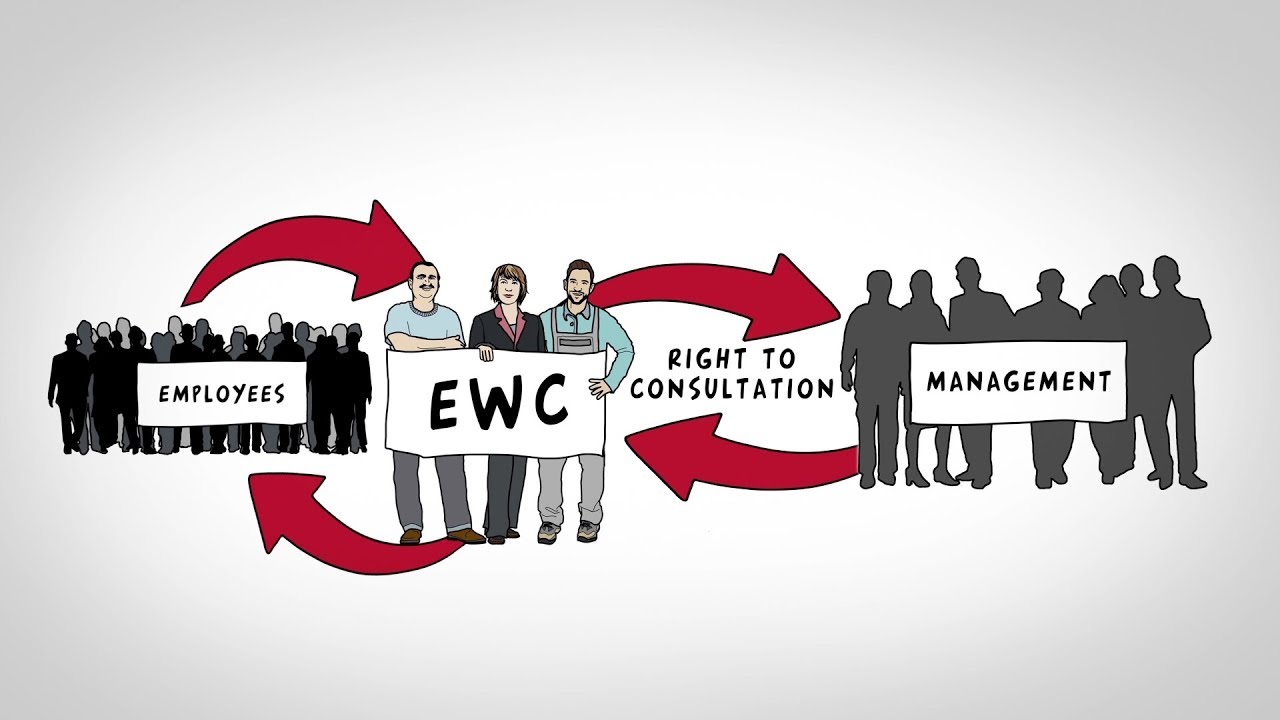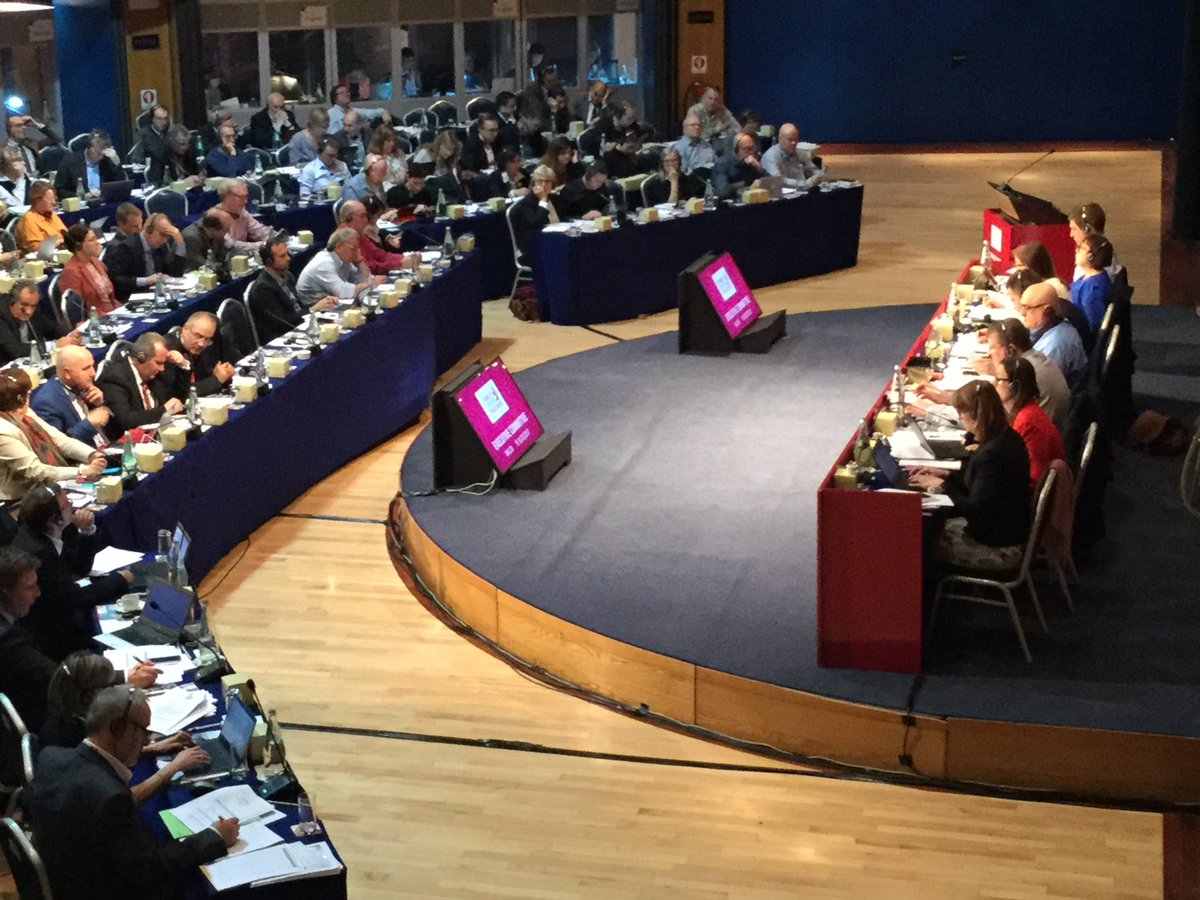The internationalisation of labour markets has had huge impacts on employment & working conditions. Today workers are often employed by a company with its headquarters in another EU country. Crucial strategic decisions are no longer taken by national management only, but in European or global headquarters. These circumstances often hamper worker representation and social dialogue at the national level since the actual decisions are taken somewhere else. The ETUC calls for a mechanism to ensure that workers’ rights to be informed and consulted are effectively respected, especially at EU level.
What’s an EWC?
When a company is established in several EU countries, the EWC represents the workers of the company in meetings with central management. They bring together at least one representative from each EU country in which a multinational company operates. During EWC meetings, these representatives deal with all questions that concern the company as a whole or at least 2 member states. In other words: questions of transnational character.

Directive 94/45/EC is the legal basis for EWCs. It applies to transnational undertakings and groups of undertakings employing more than 1000 employees in the European Economic Area (EEA), and at least 150 of them in 2 member states.
In 2009, a recast EWC directive was adopted (2009/38/EC). Although it contains some important changes as to the definitions of information, consultation and transnational issues, it is still far from being complete. The proper European Commission’s evaluation of the Recast Directive identified multiple problems with the functioning of EWCs, but yet no new or revised Directive has been approved. Some of the weaknesses of the recast directive are:
- Employers can easily stall or completely block the establishment of an EWC.
- EWCs are often informed after final decisions have already been taken.
- Confidentiality clauses are often misused by management to withhold information.
In early 2023, the European Parliament adopted a Report on the Revision of the EWC Directive, which was initiated and lead by MEP Dennis Radtke (EPP). You can find here the ETUC's reaction to the report.
About one year later, the European Commission finally proposed to revise the EWC Directive. Before, a Social Partner Consultation was launched, however the employers' position did not foresee any concrete legislative change. In fact, they did not even reply to the 2nd stage consultation. You can find the ETUC's reply to the 2nd stage consultation here.
As of September 2024, trilogue negotations between Commission, Parliament and Council have not started. The European Parliament has adopted a position in April 2024, the Council followed with its so-called general approach in June 2024. Now, after the European elections, we must wait until the new Parliament and Commission can take up the work on improving the Directive. Meanwhile, the ETUC is of course in touch with all relevant stakeholders to monitor the process.
EWCs continue to be confronted with a done deal, especially in the event of transnational company restructuring. Necessary advances are impossible without a substantial improvement of the EWC Directive. Digitalisation won’t wait and EWCs must have the means to shape it. After 10 years of practices and evidence gathering, it is time to act and make the necessary improvements in law.
The recent European Parliament Report on Democracy at Work also included most of the ETUC's demands on a revision of the EWC Directive - amongst other - the need for effective enforcement.
The ETUC is advocating for a revision of the EWC Directive based on the 10 demands, which include the following elements:
- enforcement of the rights through effective and dissuasive sanctions including a right to a temporary suspension of company decisions with a national trade union prerogative,
- access to justice,
- a right for trade union experts to participate in all EWC and to have access to all sites,
- coordination between the different levels of information and consultation,
- definition of “consultation”, “controlling undertakings” to avoid regime shopping and use of letterbox companies,
- recognition of the role of EU-level trade union organisations in the subsidiary requirements,
- inclusion of “Article 13” agreements in the scope of the directive,
- definition of ”transnational character of a matter”,
- rules for negotiations with SNB,
- prevention of the abuse of confidentiality rules.
Find here a visualization of our demands with research evidence of why the current legal framework needs to be changed.
The European Trade Union Federations (ETUFs) and their member organisations provide practical support, advise and training to EWC members on a daily basis.
The ETUFs have recently (June 2024) issued joint recommendations from the European Trade Unions to members and trade union experts in SNBs and EWCs. It provides information and guidance for trade union experts and workers’ representatives in Special Negotiating Bodies (SNBs) and European Works Councils (EWCs) about the ongoing process of the revision of the European Works Council Directive and its implications both for the negotiations of future EWCs and for the operations of existing EWCs.
For this document and any further advice you can contact:
European Federation of Building and Woodworkers: [email protected]
European Federation of Food, Agriculture and Tourism Trade Unions: [email protected]
European Public Services Union: [email protected]
European Transport Workers Federation: [email protected]
INDUSTRIALL Europe: [email protected]; [email protected]
UNI EUROPA: [email protected]
More actions
Once a year the ETUC organises the annual EWC conference with EWC representatives from all over Europe – a unique opportunity to exchange with colleagues and European decision-makers.
The ETUC together with national confederations organise a series of events in different EU countries related to the framework of the Democracy at work strategy - especially on the issue of EWCs.
The ETUC – in close cooperation with the ETUI and the European Trade Union Federations – also offers a series of trainings to EWC members and workers’ representatives. These workshops deal with key issues and challenges for EWC members such as litigations, workers’ rights in restructuring processes.

